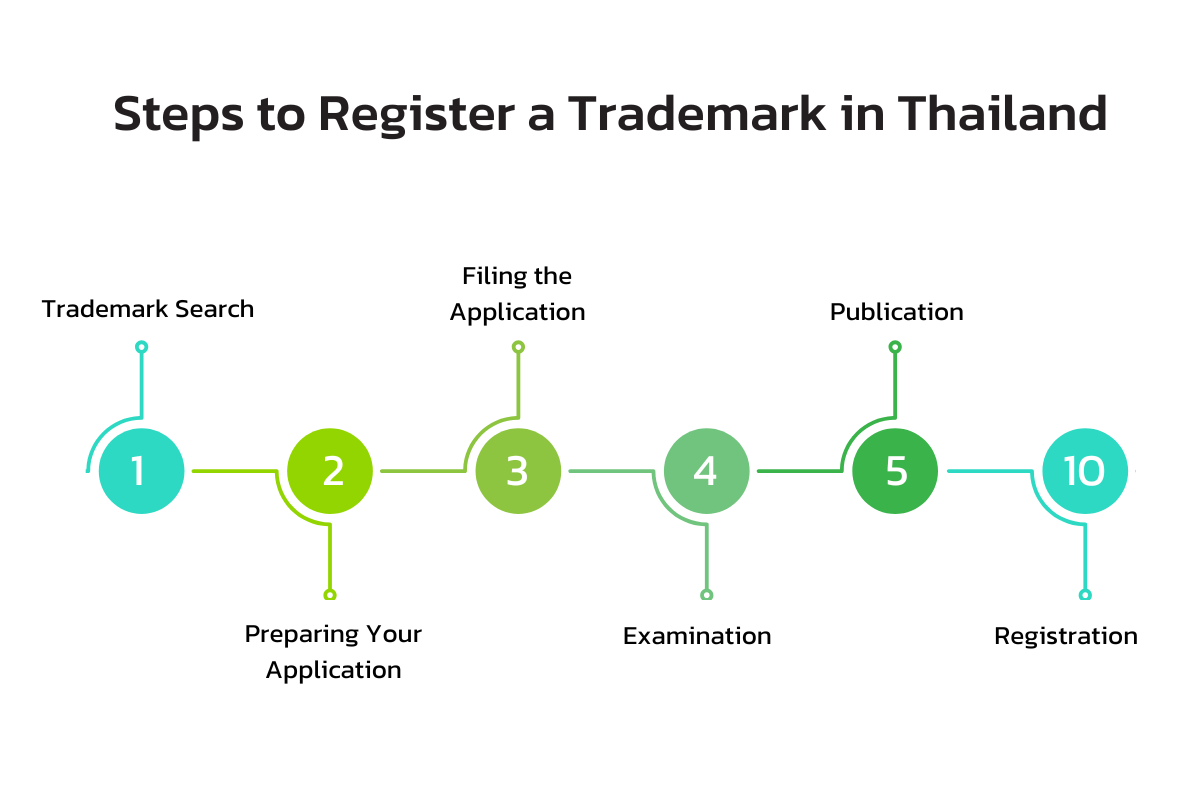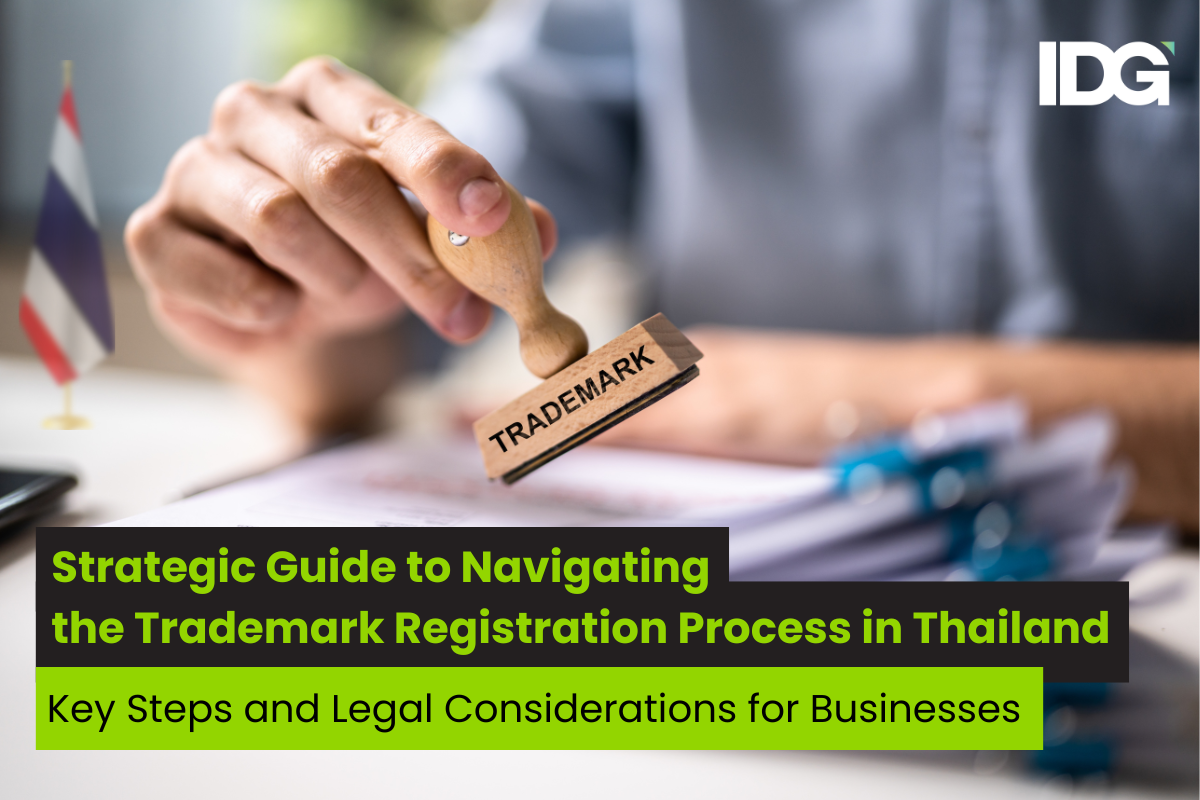In Thailand, a trademark is a distinctive sign that identifies certain goods or services as those produced or provided by a specific person or enterprise. Its primary purpose is to distinguish the products or services of one business from those of other businesses. The legal framework for trademarks in Thailand is provided by the Trademark Act B.E. 2534 (1991) and its subsequent amendments. This framework is designed to protect the rights of trademark owners and to foster consumer trust and market efficiency by preventing confusion and deception in the marketplace.
A trademark in Thailand can consist of words, names, symbols, colors, holograms, sounds, or any combination thereof that can distinguish the goods or services of one entity from those of others. Trademarks are registered through the Department of Intellectual Property (DIP), which is the governmental body responsible for trademark registration and protection in Thailand.
Key Features of a Trademark in Thailand
Distinctiveness: A trademark must be distinctive enough to be distinguishable from other trademarks related to similar goods or services. It should not be directly descriptive of the goods or services it represents.
Non-Deceptiveness: A trademark must not deceive the public or cause confusion regarding the nature, quality, or geographical origin of the goods or services.
Legality: The trademark should not be contrary to public order, morality, or national laws.
Types of Trademarks in Thailand
Trademarks: Signs that distinguish the goods or services of different enterprises.
Certification Marks: Marks that certify the nature, quality, or other characteristics of goods or services.
Collective Marks: Trademarks owned by organizations (associations, groups, or cooperatives) used by their members.
Service Marks: Specifically identify and distinguish the services rather than goods provided by an entity.
Trade Names: Names or designations used in trade to identify a business as a whole.
Trademark Registration Process
Registering a trademark in Thailand grants the owner exclusive rights to use the mark in relation to the goods or services for which it is registered. This includes the right to prevent unauthorized use of the trademark by third parties. The process involves several steps, including a search for existing trademarks, application submission, examination by the DIP, publication for opposition, and, if no opposition arises or if it is successfully overcome, registration and issuance of a certificate.
Protection and Enforcement
Once registered, a trademark is protected in Thailand for ten years from the date of application and can be renewed indefinitely for further ten-year periods. Trademark protection is territorial, meaning it is only effective within the borders of Thailand. Enforcement of trademark rights can be carried out through administrative actions by the DIP, civil litigation, or criminal prosecution, depending on the nature of the infringement.
Registering a trademark in Thailand involves a series of steps, each with its own requirements and time frames. Understanding the process is crucial for successful trademark protection within the country. Here’s a comprehensive guide to help you navigate the registration process, along with recommendations to ensure a smoother journey

1.Trademark Search
What to do: Conduct a thorough search in the Thai Department of Intellectual Property’s (DIP) database to check for any similar or identical trademarks that could affect your application.
Why it’s important: This step reduces the risk of objections or refusals based on existing trademarks.
Recommendation: Employ a local trademark attorney or specialist to conduct the search, as they can provide insights into the likelihood of registration success.
2.Preparing Your Application
What to do: Prepare a detailed application, including a clear representation of your trademark, a list of goods or services to be covered, and any claim to priority from an earlier filed application in another country.
Recommendation: Ensure your trademark is distinctive and does not infringe on existing trademarks. Non-English trademarks must be accompanied by a Thai translation.
3.Filing the Application
What to do: Submit your application to the Thai Department of Intellectual Property either online or in person.
Recommendation: Double-check your application for completeness and accuracy to avoid delays.
4.Examination
Time frame: Approximately 8-12 months.
What to do: The DIP will examine your application for compliance with the Trademark Act, including checks for distinctiveness, non-deceptiveness, and non-conflict with prior trademarks.
Recommendation: Be prepared to respond to any objections or requests for clarification from the examiner.
5.Publication
Time frame: 60 days
What to do: If the application passes the examination phase, it will be published in DIP gazette to allow for public opposition.
Recommendation: Monitor the publication closely to respond promptly to any opposition.
6.Registration
Time frame: If there is no opposition, or if opposition is overcome, the registration certificate is usually issued within 1 months after publication.
What to do: Once your trademark is registered, you will receive a certificate of registration.
Recommendation: Keep the certificate safe and note the renewal date. Trademark registration in Thailand is valid for 10 years from the date of application and can be renewed. A trademark can be renewed up to three months before the deadline and six months after the deadline with an additional cost of 20%.
Additional Tips and Recommendations
Legal Assistance: Consider hiring a reputable trademark attorney or agent in Thailand to navigate the registration process, especially if you are unfamiliar with the local legal system.
Timely Responses: Be prompt in responding to any communications from the Thai DIP to avoid unnecessary delays in your application process.
Renewal: Keep track of the renewal deadline for your trademark to ensure continuous protection. Renewal can be done within six months before the expiry date.

